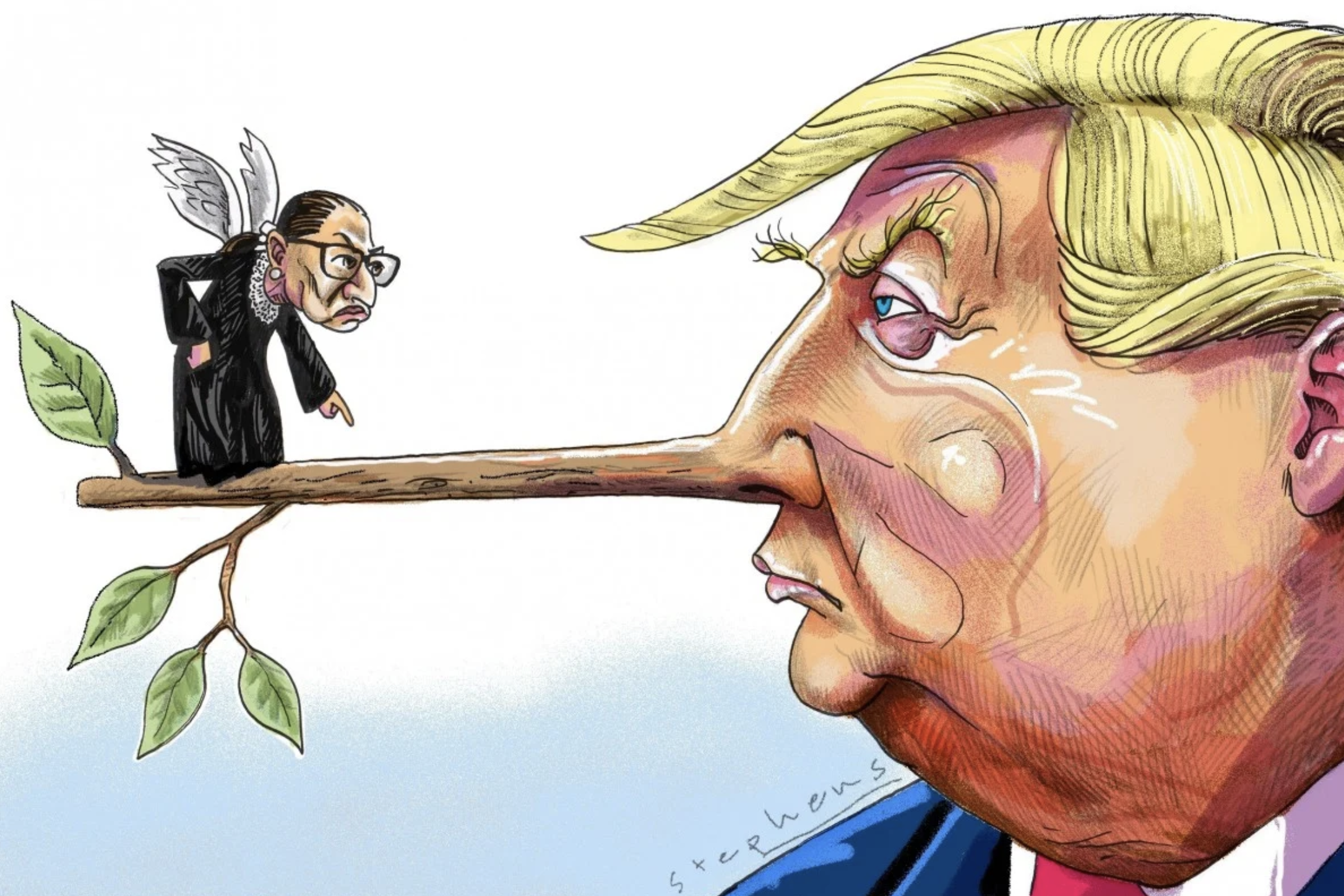TOM PLATE WRITES — There was always something of the Goliath versus David, if you framed such a thesis/antithesis picture: of Ruth Bader Ginsburg up against Donald J. Trump – the diminutive versus the hulk, the thinker versus the non-thinker, the caring versus the uncaring. But someone of stature had to stand up to him, and the late Associate Justice of the Supreme Court was one of the few who could take his measure. And so, when the feminist icon with a light wit and profound knowledge of the law was overwhelmed late last week by the cancer that had been stalking her for so many years, much of the world stood up and took notice.
Here in the U.S., on seeing the incumbent American president vulnerable to Democrat Joseph Biden in the coming election, many could not have helped wishing fate had let this Wonder Woman, feisty to the end, ride out the hoped-for end of Trump for just a couple of months and permit his (hoped-for) successor to choose a sensible Supreme Court nominee at the end of January, when she would step down. But ‘fate keeps on happening’, as the Hollywood screen-writer Anita Loos put it decades ago. And as fate would happen, there is now a vacancy on the land’s highest and most powerful court. Unsurprisingly, Trump’s allies are scrambling to fill it with someone who would no doubt prove to be the antithesis of the ‘Notorious RBG,’ the epithet spun from the late rap star ‘Notorious B.I.G.’.
There’s additional meaning to the phenomenal story of feminist icon Ruth Bader Ginsburg beyond presidential politics. That her capitulation last week, at 87, to the persistent poison of cancer should have released such a vast international outpouring of grief and respect suggests considerably more to what she signified. Allow me to steal a thought from Carlo Ginzburg (no relation to Associate Supreme Court Justice Ginsburg), the great historian from Italy, writing in a recent issue of the provocative London-based ‘New Left Review’. What holds a people or a city or a nation together, he insisted, goes beyond mere institutional matrices and public policies and so on: Nations and peoples tend to bond at least as tightly for reasons of negative history and shared shameful experience. Shame can prove a fiercer national adhesive than love. “Shame … falls upon us, invading us – our bodies, our feelings, our thoughts as a sudden illness,” writes the historian, serving to bind people together in a community of feeling.
This is precisely where America now precariously sits – no longer bathing in the triumphalism of the 1989 unipolar moment; nor in the continued transmission of the numbing narcotic of exceptionalism; but in a shared sense of shame. From the war in Vietnam to the blunders in Iraq and Libya, from the 2007-08 Wall Street-inseminated global greed to the ongoing bifurcation of communities as paraded by ‘Black Lives Matter’? And so out of the miserable miasma of the ever-political Washington – “the swamp,” as President Trump memorably (and now, we see, cynically) dubbed it – arose this top jurist, railing against repression.
In terms of range, quality and impact, her decisions from the bench, whether in concurrence with the majority or in storm of dissent, were heavyweight hits by this judicial diva, diminutive in size alone. Often with insight and wit, she helped remind Americans, many in deep need of reassurance, that in Washington there was a least some people not thinking only about themselves but actually doing their job. At a time when the White House/Executive Branch was seen to bungle the pandemic portfolio, when the U.S. Senate sunk to a Siamese fighting-fish bowl of horrors, and when too many – far from all, but some – of our police never seemed to sight a black citizen they didn’t want to arrest or shoot, Justice Ginsburg emerged, as if the goddess Nemesis. She zoomed upwardly mobile-from a modest Brooklyn home to the Ivy League, on merit alone (one of nine women in admitted to Harvard Law School in 1956, transferring to Columbia Law school in 1958, from which she emerged first in her class), she stood out wherever she went, fearing that standing in place would automatically trigger retreat, whether of the nation or of her own psyche, or both.
They say that in the land of the blind, the one-eyed man is king, or in this case (as Plato was the first to agree) queen. But though the queen is now dead, she will continue to live in her best rulings and her best dissents. In politics, style is as important as substance, though it cannot replace it. At a time when many citizens are so angry – some scarily so – a truly egalitarian new deal of access and opportunity is needed, driven by a more neutral and careful politics than that of a system featuring but a single ruling party that claims to know everything or a two-party system that says the other side is always wrong.
May the Notorious One rest in a long celestial peace – well deserved. We, however, must not stand down but must carry on with the embers of hope that she helped kindle: a sense of a nation and a people less selfish and shameful, more loving and just, than the one we find ourselves in now. Think of it — perhaps – as the Notorious Renewal.
Prof. Tom Plate teaches at Loyola Marymount University in Los Angeles, recently completing a course titled “Ethics, Morality and Public Life: Contemporary Controversies.” He is vice president of the Pacific Century Institute and founder and president of Asia Media International at LMU.

